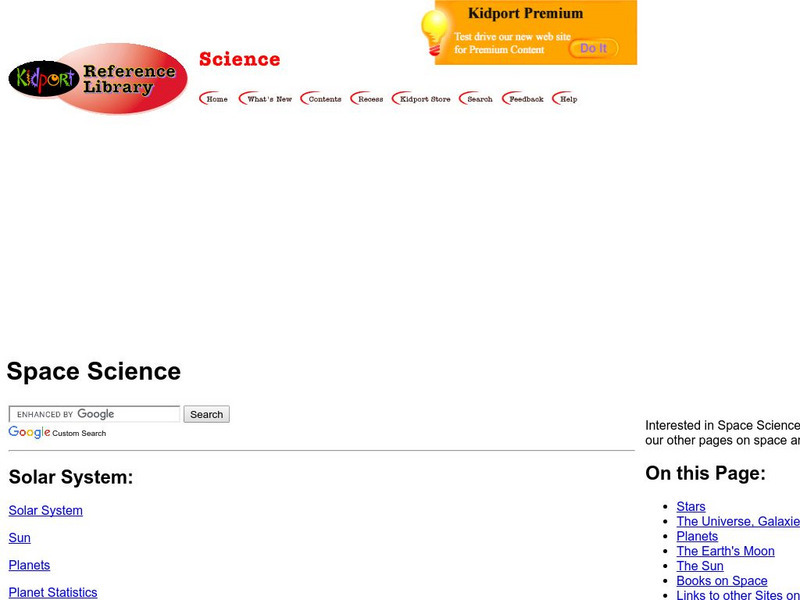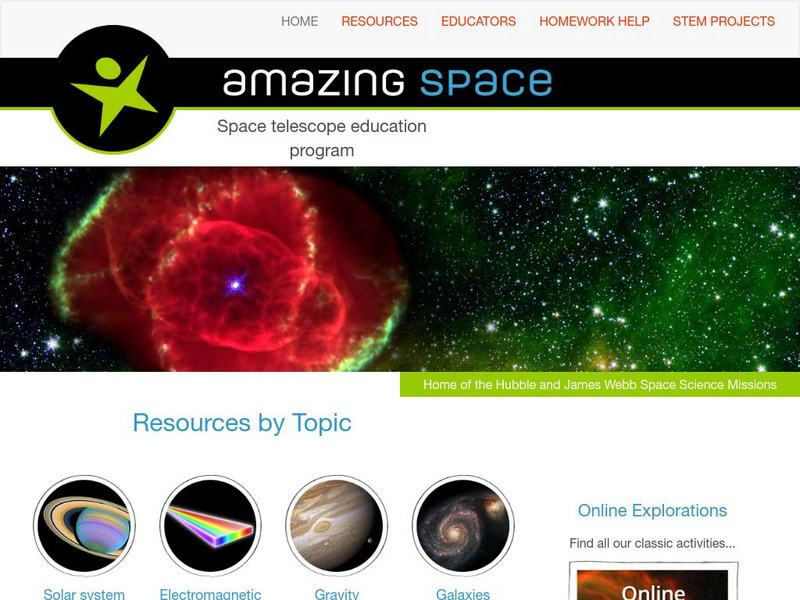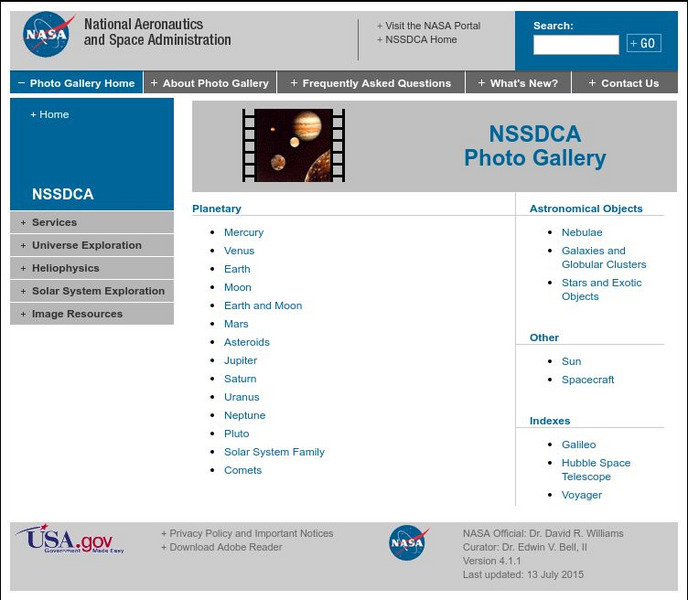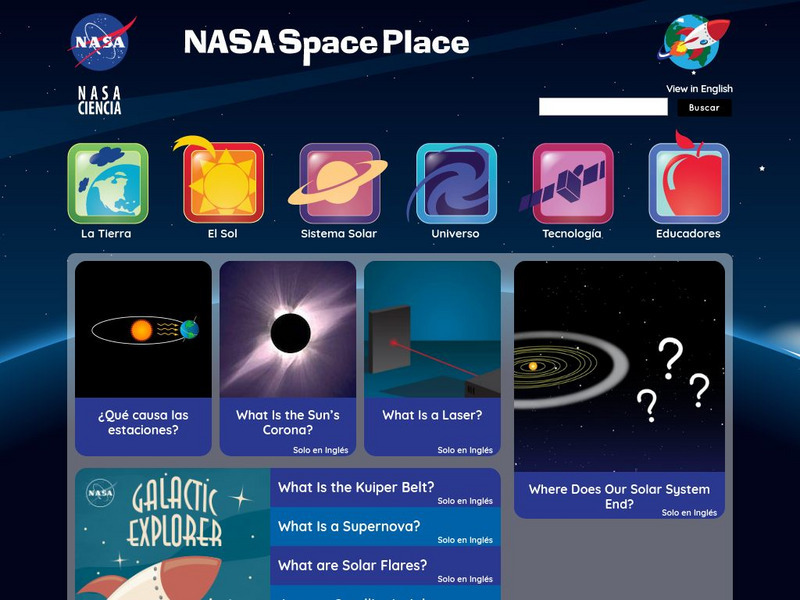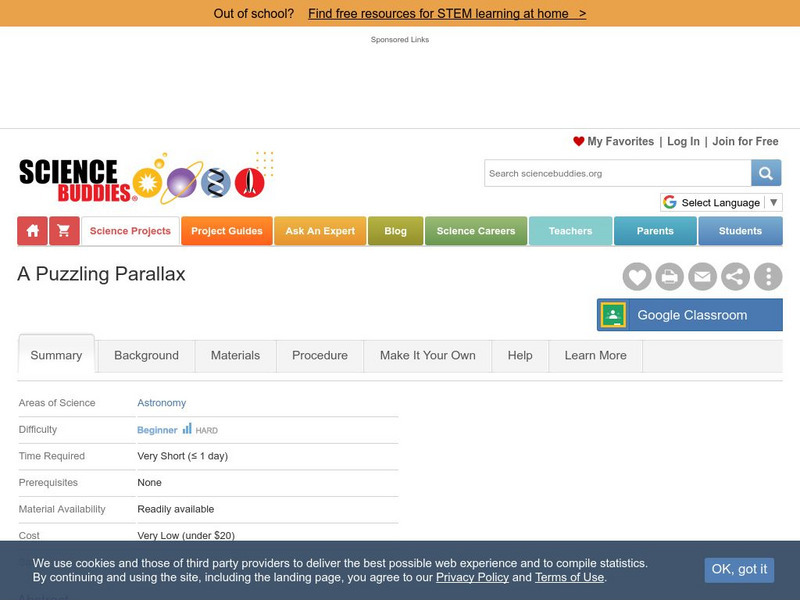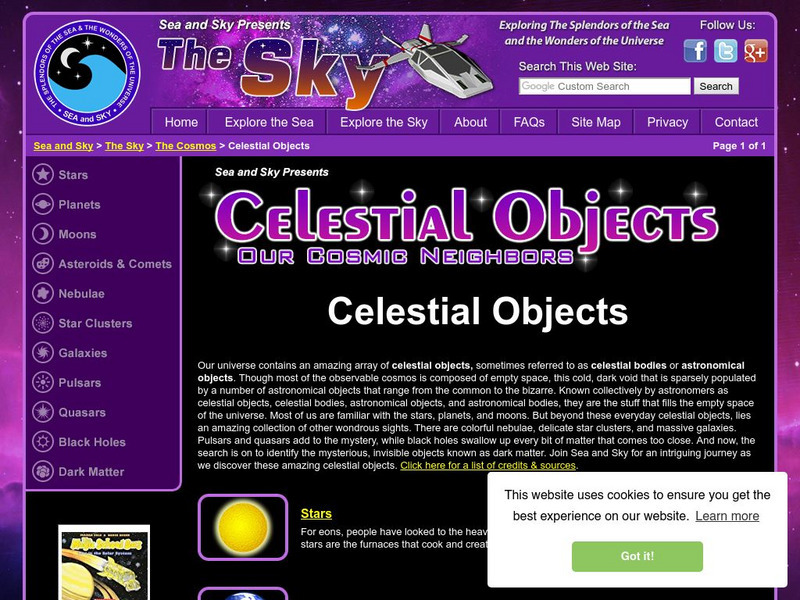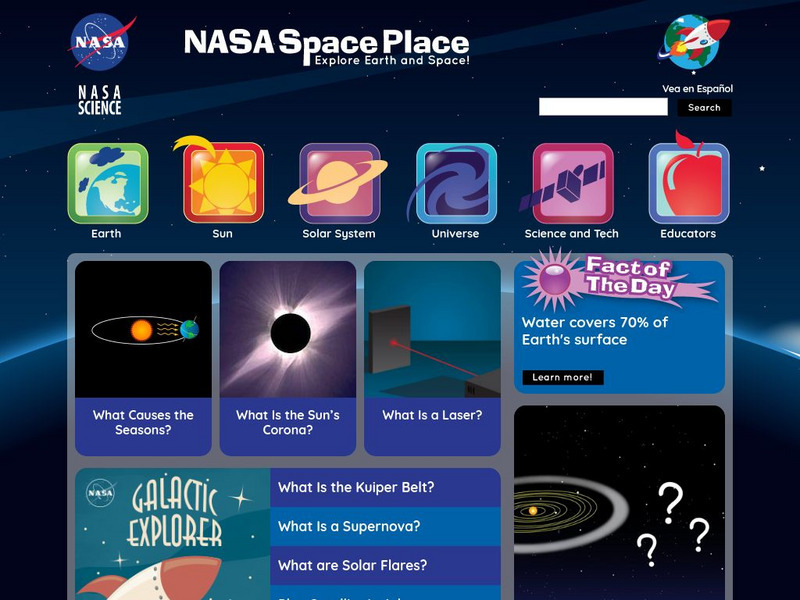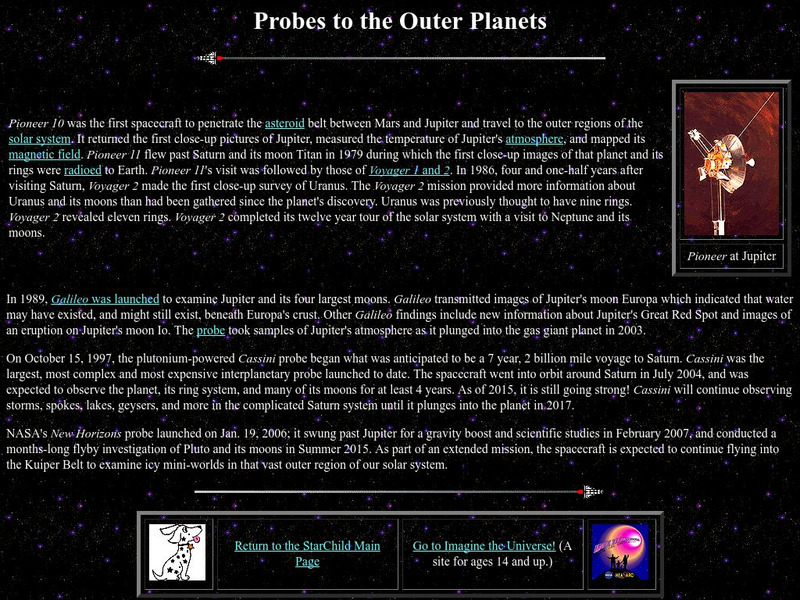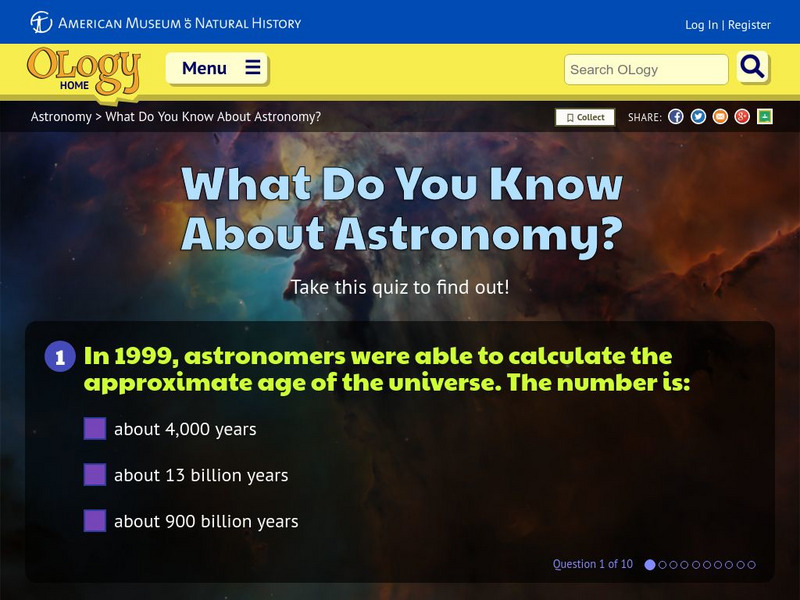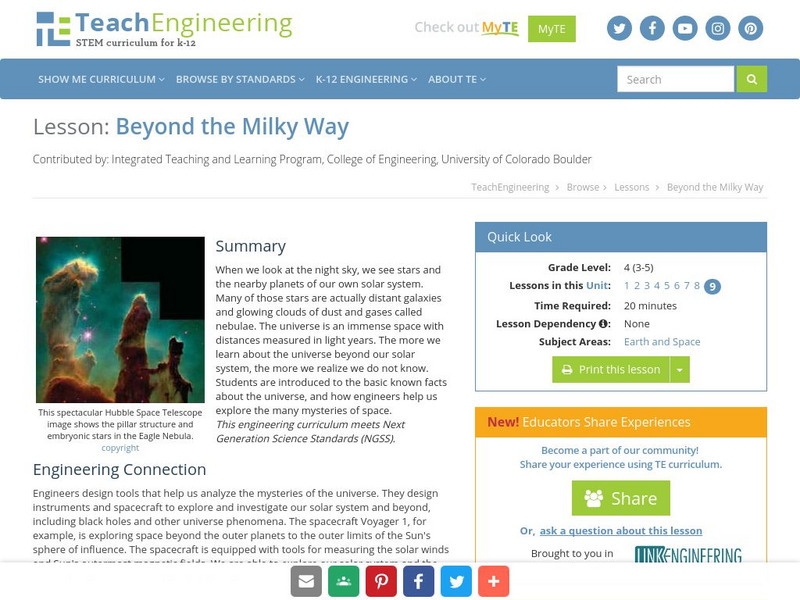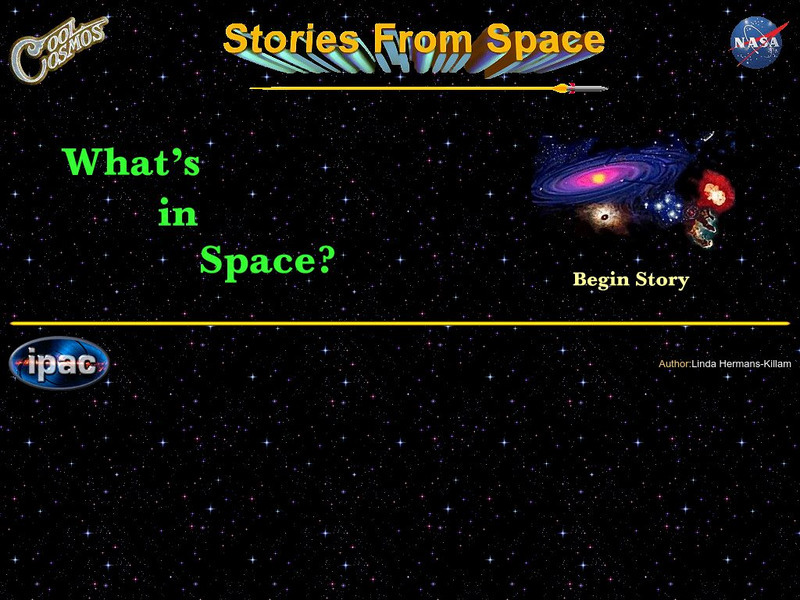Hi, what do you want to do?
Other
Space Science Institute: Alien Earths: Star and Planet Formation
Learn about the lives of stars, and how stars and planets form. The Interactive activity, 'Planet Families' requires Adobe Flash and cannot be launched.
Enchanted Learning
Enchanted Learning: Zoom Astronomy: All About Space
A fantastic collection of information about the solar system. Includes information on all of the planets, the moon, the sun, asteroids, comets, meteoroids, and stars. Also find puzzles, a dictionary, quizzes, classroom activities, and...
Kidport
Kidport: Space Science
This complete resource will help students to improve their understand of space exploration. Includes images of the universe, galaxies, stars and planets.
Other
Hong Kong Space Museum
Besides an introduction to exhibitions and events at the museum, the site provides a guide to stargazing, an astronomy FAQ, space news, virtual tours (see site map) and research resources (including Chinese-English star and constellation...
NASA
Nasa: The Space Place
This site is geared towards elementary learners, but most lessons can be modified for older learners. Space-related classroom activities, printable images of Earth and space, thought-provoking Space Place Musing podcasts and math-related...
Space Telescope Science Institute
Space Telescope Science Institute: Amazing Space
Amazing Space promotes the "science and majestic beauty of the universe for use in the classroom." Here you can find learning activities, lesson plans, teaching guides, and helpful tips for students eager to learn about space and space...
NASA
Nasa Space Science Data Archive: Photo Gallery
A website featuring a collection of images from NASA. Collection includes images of planets, comets, nebulae, galaxies, stars, sun, and spacecrafts.
NASA
Nasa Space Place: El Space Place
NASA's space science site for kids - en Espanol. Features a wide range of activities, including games, projects, animations, and more. Also contains useful information on basic physics, chemistry, and other natural sciences, offering...
NASA
Nasa: Image Science Center: Ask the Space Scientist
A NASA scientist, Dr. Sten Odenwald, answers many students' questions. Topics include planets, galaxies, black holes, the origin of the universe, and common misconceptions about space.
Other
Astromador: Astronomia Para Amadores
This resources focuses exclusively on astronomy. It's packed with historical facts about space exploration, famous people who pioneered the study of stars and planets. It features chronological list of space exploration, current news,...
Science Buddies
Science Buddies: A Puzzling Parallax
Did you know that ancient astronomers could measure the distance to other stars? They could also distinguish between stars and planets. How could they do that without modern technology of telescopes? See if you can discover the link...
ClassFlow
Class Flow: Space Solar System
[Free Registration/Login Required] In this lesson students will compare and contrast the attributes of star, star patterns and planets. Students will also have the opportunity to review facts about each planet and then complete various...
BBC
Bb Ci Space: Solar System
Take a journey through the solar system with this interactive guide. Includes planetary history, "travel information," "tourist highlights," and video clips. Games and quizzes include a Solar System jigsaw that prompts the student to...
Smithsonian Institution
National Air and Space Museum: Exploring the Planets: Ancient Times & the Greeks
In ancient times only five planets were known: Mercury, Venus, Mars, Jupiter, and Saturn. Learn about Greek astronomer Ptolemy's theory for the solar system that was to survive for fourteen centuries.
Other
Sea and Sky: Celestial Objects
Empty space in outer space is not truly empty. Celestial objects fill the space not occupied by planets, stars, and such. This resource identifies these objects and further explains their existence.
NASA
Nasa Space Place: What Is an Exoplanet?
Defines exoplanets and explains how astronomers go about looking for them.
NASA
Nasa: The Space Place
This site from NASA's Space Place is geared towards early elementary learners. It offers detailed instructions for crafts and activities related to space, games and a teacher resource area. Students can also ask an expert at this site.
NASA
Nasa Star Child: Probes to the Outer Planets (Level 2)
This site has a description of the many probes sent to the outer planets, including pictures and vocabulary words linked to a glossary of terms. Other links on interesting facts and more detailed information are also included.
Space Telescope Science Institute
Space Telescope Science Institute: Hubble Site
Explore the universe and celestial phenomena made visible by Hubble. High-quality photos of planets, stars, nebulae, and galaxies, complete with individual descriptions, can be viewed online and downloaded for printing and personal use.
American Museum of Natural History
American Museum of Natural History: O Logy: What Do You Know? Astronomy
Take this ten-question self-scoring quiz to test your knowledge of astronomy facts: age of the universe, why stars and planets are spheres, where other life might exist in the outer space, the Milky Way, and more.
Unite for Literacy
Unite for Literacy: Earth and Sky: The Night Sky
Read about the sights you can see in a clear night sky. Book includes audio narration in 16 additional languages with text in English.
Other
Sea and Sky: A Tour of the Solar System
Take a virtual tour of the solar system starting with detailed information about the sun.
TeachEngineering
Teach Engineering: Beyond the Milky Way
When we look at the night sky, we see stars and the nearby planets of our own solar system. Many of those stars are actually distant galaxies and glowing clouds of dust and gases called nebulae. The universe is an immense space with...
California Institute of Technology
Cal Tech: Stories From Space: What's in Space?
Through this story you will be introduced to outer space: stars, the Milky Way, planets, the Solar System, the Sun, clouds of dust and gas, galaxies.







